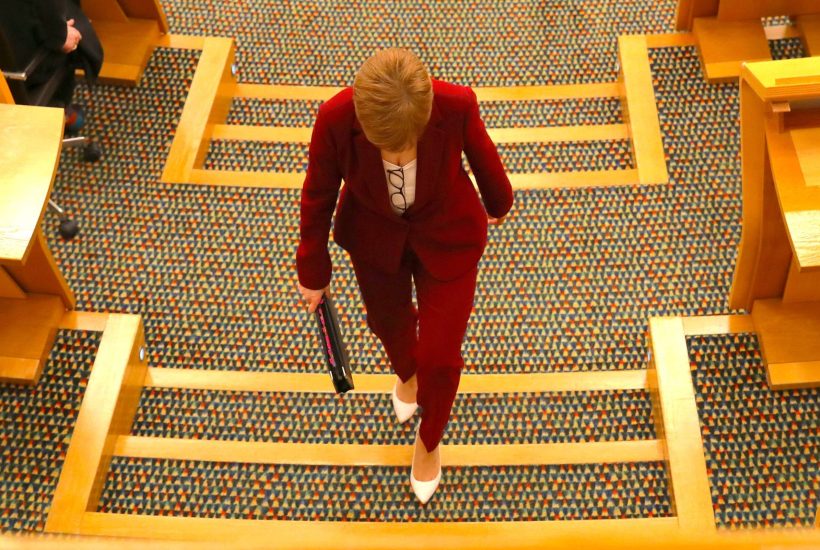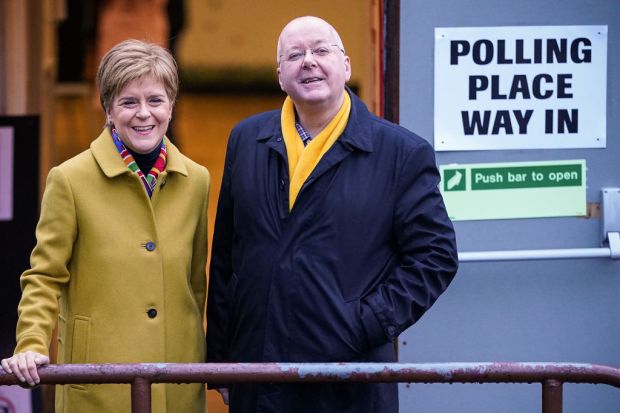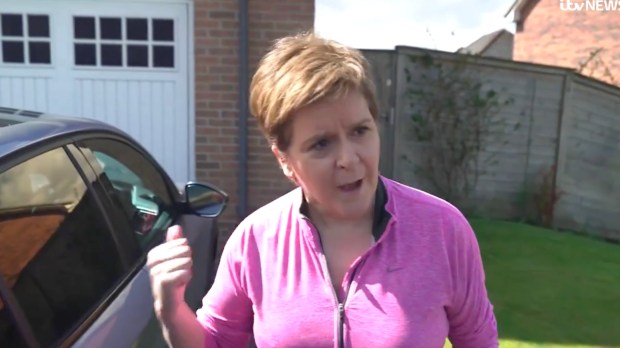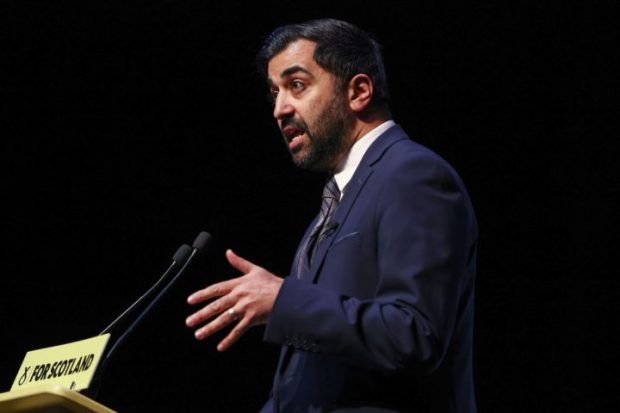The SNP are holding their annual conference this weekend and, the times being what they are, it is a virtual affair. Speeches have been recorded in advance and I understand at least one cabinet minister was informed his first effort failed to meet the required standard and needed to be recorded again. Perhaps it was insufficiently boosterish.
As is by now a matter of time-honoured tradition, no SNP gathering — whether in person or via video — can take place without the announcement of a fresh push for a second independence referendum. These are launched every spring and then launched again every autumn. That none of them ever produce anything of substance must now be considered part of their charm. A sham performance for a party willing to believe in anything except reality.
There is no prospect of an independence referendum at all, let alone one on the timescale favoured by Nicola Sturgeon and her party. Doubtless the Scottish parliament will pass a referendum bill at some point next year but doing so cannot change the fact Holyrood cannot deliver a referendum. Nor can it do so until such time as a referendum is what a clear and sustained majority of the Scottish people want. Boris Johnson is not blocking a plebiscite; the people of Scotland are.
Despite this, we shall have to endure more fantasy. The SNP ask us to believe that Johnson’s government — currently busy building a ‘wall of indifference’ on the national question — will buckle and accept that a referendum cannot be avoided. But if, as the SNP aver, the nationalists would win that referendum, why should Johnson agree to hold a referendum he would lose? What’s in it for him?
No satisfactory answer is ever proffered to this. Instead, we are asked to believe, first, that Johnson is a shameless scoundrel and, second, that he can be shamed into granting the referendum. The apparent contradiction between these two beliefs is resolved by insisting, against all evidence, that Johnson is not actually the man the SNP insist he is.
Sturgeon has been first minister for seven years and the reality is that she can no more deliver a referendum now than she could last year or the year before that or the year before that. This may be disagreeable but then reality often is.
The SNP are firmly entrenched as Scotland’s natural party of government and Sturgeon is a formidable election-winning politician. Beyond that, however, a haunting question arises: if independence is off the agenda for the time being, what is Sturgeon’s government actually for? It is in office but it is not delivering. From the NHS to education to transport, the story is at least consistent: targets are issued and then missed. That no political price is paid for these failures is a reminder of the ‘easy mode’ on which the SNP is permitted to play and proof of the essential zombie nature of modern Scottish politics.
Now it may be that a Westminster election in 2023 (if there is one) might change the political landscape but this is a shoogly peg upon which to hang a nation’s future and a confirmation, if nothing else, that Scottish politics will remain in a state of frozen animation until such time as something breaks somewhere else.
But if a UK general election does not actually materially change anything, a fresh question arises: how long does Nicola Sturgeon wish to remain in office?
Interviewing Sturgeon earlier this week, Laura Kuennsberg asked the first minister a very specific question. Would she commit to leading the SNP into the next Holyrood election, due to be held in 2026? In reply, Sturgeon said this: ‘I will fulfil the mandate I’ve been given to govern as first minister for this term of the Scottish parliament.’
You will note that this is not actually an answer to the question asked.
From which it therefore follows that if this interview was in part an attempt to dampen speculation about the first minister’s intentions and future, it was a singular failure. But then that speculation is a wolf set running by Sturgeon herself. For it is the first minister who has taken to talking about her future. It is Nicola Sturgeon who has raised the subject of her memoirs and it is Nicola Sturgeon who has revealed she and her husband, SNP chief executive Peter Murrell, have talked about perhaps fostering children. And it is Nicola Sturgeon, who is only 51 but who has been in public life, one way or another, for almost 30 years, who told Kuennsberg that she hopes to still be ‘relatively young when I get to the point of contemplating other things’. I think it reasonable to assume that the clock is ticking on ‘relatively young’.
So, sure, the headlines earned by this interview were all about how the first minister is, in her own words, not ‘going anywhere right now as first minister’ (and how Janus-truthed that is!) but the deeper reality of what she said was this confirmation that, after seven years as first minister, Sturgeon is contemplating life after Bute House.
It has been apparent for some time that Sturgeon has wearied of what she terms ‘politics as normal’. In certain respects, the pandemic has changed her perspective. She has less patience with the usual political gamesmanship and, at least some of the time, I suspect this impatience is genuine. These are serious times and the usual fannying about seems more self-indulgent than is customarily the case.
For some time now she has had the demeanour of a person chafing against the limitations of life in a small but stateless country. She would not be the first nationalist to encounter this frustration. For all that Alex Salmond revelled in being first minister, it was never any secret that, as a matter of parliamentary life, he very much preferred the bright lights of Westminster to the couthier charms of Holyrood. The big show was elsewhere and if plenty of non-political — or even unionist! — Scots have always suspected this then nationalists may be permitted to do so too.
A YouGov poll for the Times published this week confirmed that, despite everything, nothing has really changed. Support for independence is at 47 per cent but, perhaps more tellingly, Sturgeon’s own approval rating has fallen by 40 points in the past year. It remains — and this is significant — in positive territory but she no longer enjoys the +50 ratings she recorded a year ago. I suspect this reflects a Covid-related exhaustion as much as anything else but it is also evident that Sturgeon no longer possesses an ability to unite the country behind her.
And the more she bores on about independence, the more divisive she becomes. She might talk about the post-pandemic era as a moment for the forging of a new and thrilling future but, after all this, I think the public’s appetite for years more constitutional argument is sharply limited. Monomaniacs — which is her base, after all — cannot see this but that is all the greater reason for looking at a bigger, broader, picture.
It is Sturgeon’s quiet tragedy that she cannot do this. She is forever borne back towards her own folk, forever required to dangle independence before them. This time, Charlie Brown, Lucy really won’t take the football away at the last minute. Believe that, though, and you’re the cheapest date in British politics.
And it has consequences too. The SNP does not exist to win Holyrood elections. It exists to lead Scotland to independence. As such, what matters is not the here and now but the possibility of tomorrow. Safer, then, to avoid confrontation with vested interests if that kind of argument might risk alienating people whose votes will be needed in the much greater battle to come.
Sturgeon is thus made by the independence cause and, in a governing sense, also unmade by it. A profoundly unsatisfactory state of affairs and one that, in her more reflective moments, she must sometimes recognise herself. So much so, she may be forgiven for contemplating an alternative future for herself.
This weekend, however, the pretence must be maintained. But it is only a show, a Potemkin push for independence and, as such, an essentially fraudulent and hollow performance. The punters will love it.
Got something to add? Join the discussion and comment below.
Get 10 issues for just $10
Subscribe to The Spectator Australia today for the next 10 magazine issues, plus full online access, for just $10.





















Comments
Don't miss out
Join the conversation with other Spectator Australia readers. Subscribe to leave a comment.
SUBSCRIBEAlready a subscriber? Log in